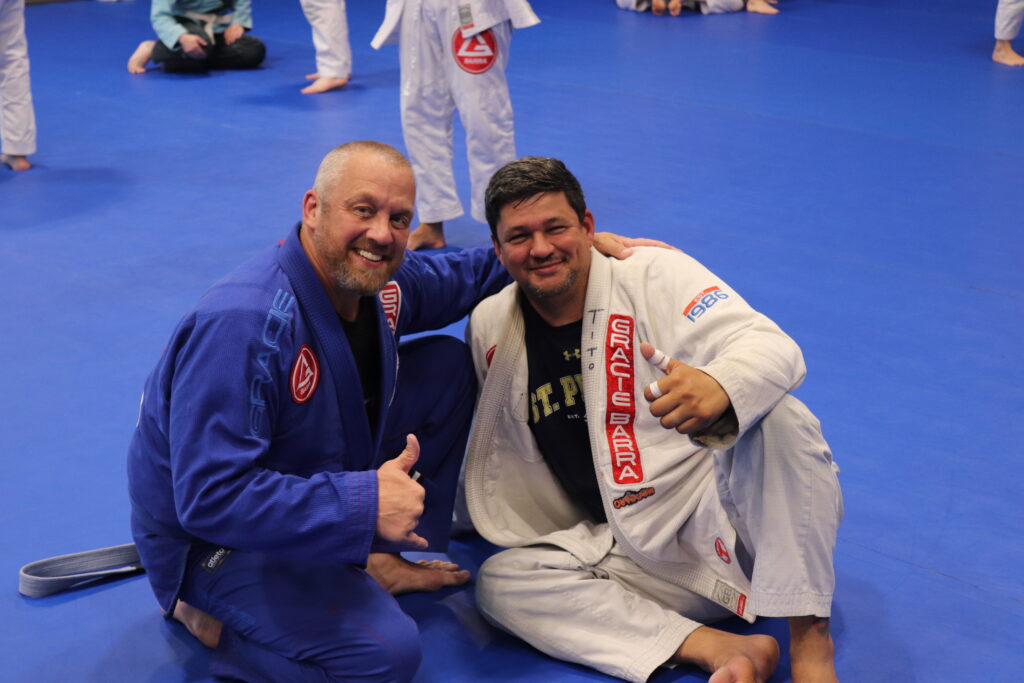Starting a Brazilian jiu-jitsu practice is exciting, a little overwhelming, and certainly one of the best things you can do for your mind, body, and overall well-being. When you train at Gracie Barra, you are building your practice on a solid foundation based on a time-tested curriculum designed for your success.
Before you attend your first class, there are some helpful tips to make your experience more fulfilling and less overwhelming, setting you up for a long and enjoyable BJJ journey.
Become familiar with Gracie Barra
The roots of Gracie Barra reach more than 100 years back when Carlos Gracie was introduced to the practice in 1916 by Mitsuyo Maeda, a Japanese practitioner who brought the art of jiu-jitsu to Brazil. Carlos, followed by other Gracie family members, took those fundamentals and cultivated the practice that is now Gracie Barra jiu-jitsu. We use those fundamentals to this day, which is reinforced by a strong sense of community and belonging. Learn more about Gracie Barra’s history by clicking here.
Jiu-jitsu schools that don’t offer such a rich legacy often struggle with high student turnover and don’t have a strong community that makes white belts feel welcome and keeps higher belts coming back to train for years. Not only are Gracie Barra classes accessible for all skill levels, but students also have opportunities to engage in workshops and boot camps, as well as events that welcome the entire family.
Becoming familiar with the history of Gracie Barra helps you appreciate and embrace it, and helps you understand why it is so special to be part of the Gracie Barra family.
Leave ego at the door
To the average observer, mixed martial arts (MMA) competitions and Brazilian jiu-jitsu tournaments may give the impression that the priority on the mat is to dominate an opponent at all costs. The reality is quite different. The mat is no place for overly competitive ego. BJJ training is focused on learning and helping others to learn as well.
Therefore, it is important to enter your first class knowing everyone is there to learn, not to win. Even in the case of sparring (or rolling as it is sometimes called), applying the techniques you have learned is the entire objective, not to win. That said, be prepared to be submitted by your partner—it will happen a lot—and try your best to maintain good sportsmanship.
Resist putting pressure on yourself. BJJ takes time
Gracie Barra has a refined curriculum and a well-established class structure that is designed for student success in the long term. However, it is important to understand that learning the art of jiu-jitsu takes time. Trust the process and have patience.
There are a few sure-fire ways to know if you are putting too much pressure on yourself.
- Thinking you should remember everything the first time you learn it
- Thinking you should be progressing faster than you currently are
- Thinking you should be able to submit someone who is smaller or weaker than you
- Thinking you should be able to submit someone who is less experienced
- Thinking you should be able to execute a technique right after learning it
- Thinking you should never or rarely tap out
Putting unnecessary pressure on yourself can bring frustration and make you less likely to stick with your practice. Advancing in BJJ takes time for everyone, so keep an open mind, show up to class consistently, and focus on enjoying the process.
Lean on training partners
One of the best aspects of training at Gracie Barra is finding training partners that quickly become your training buddies. Brazilian Jiu-Jitsu is for everyone, and you will meet all kinds of interesting people on the mat. You will have one important thing in common with all of them—you all want to get better at jiu-jitsu!
So, it is best to work with your partner, walk through new techniques collaboratively, and feel free to offer encouragement. By leaning on partners and inviting them to lean on you, the entire practice becomes more enjoyable.
A few tips for being a good training partner:
- When helping your partner learn an offensive technique, hold your frames and imitate a live partner, not a limp training dummy.
- Alternatively, don’t give too much resistance or be too stiff when your partner is trying to learn a technique. Let them get the movement down before gradually adding resistance.
- Tap! Don’t wait until you’re on the verge of injuring yourself before tapping. Once you realize you will not be able to escape your position and they start to apply a submission, give them a few gentle taps and then set up to go again.
Get to know Gracie Barra’s training etiquette by clicking here.
Gracie Barra Jacksonville’s classes are designed for all skill levels for adults and kids starting from age 4 and up. Click here to schedule a trial class for you, your child, or your entire family!

